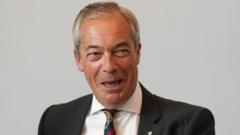Why Was Trump Surprised by Liberia's President Speaking English?

Understanding the Context of Trump's Comments on Liberia and Africa
The comments made by former President Donald Trump regarding Liberia and the English language spoken by its citizens have ignited discussions about perceptions of African nations, the historical context of Liberia, and the implications of U.S.-Africa relations. This article delves into the intricacies of Trump's remarks, the historical backdrop of Liberia, and the broader implications of U.S. policy toward African nations.
The Historical Context of Liberia
Liberia, established in 1847, is a unique nation in Africa, primarily because it was founded by freed American slaves. The capital city, Monrovia, is named after James Monroe, the fifth President of the United States, who supported the colonization of freed slaves in Africa. This historical connection has shaped Liberia's identity, as it embodies a blend of African and American cultures.
Despite being a country with a rich history, Liberia's complexities extend beyond its founding. The nation is home to over 20 indigenous languages, reflecting its diverse ethnic groups. English is the official language, primarily used in government, education, and business. The coexistence of English with indigenous languages highlights Liberia's unique cultural tapestry.
Language and Identity
Language plays a crucial role in shaping national identity. When Trump complimented Boakai's English, it inadvertently highlighted the ongoing narrative about language and its association with education and sophistication. In many societies, including the United States, proficiency in English is often perceived as a marker of intelligence and social status. This perception can lead to a skewed understanding of other cultures and their linguistic diversity.
Trump's Controversial Comments: A Pattern of Misunderstanding
Trump's remarks about Liberia are not isolated incidents. His previous comments about African nations have often drawn criticism for lacking nuance and understanding. In May, during a meeting with South African President Cyril Ramaphosa, Trump made unfounded claims regarding white farmers being victims of genocide. This assertion was met with skepticism and pushback from Ramaphosa, who aimed to maintain diplomatic relations despite the inflammatory comments.
In 2018, Trump's infamous "s***hole countries" remark about African nations and Haiti further exemplifies his controversial approach to discussing countries in Africa. Such statements have significant repercussions, contributing to harmful stereotypes and reinforcing negative perceptions of African nations.
The Impact of Stereotypes
Stereotypes about Africa often stem from generalized views that overlook the continent's diversity and complexity. These misconceptions can distort public perception and hinder constructive dialogue between the U.S. and African nations. As a result, it is crucial to challenge these stereotypes and promote a more accurate understanding of Africa's realities.
Shifting Focus: U.S. Policy Toward Africa
During the recent meeting with African leaders, Trump emphasized a shift in U.S. policy from aid to trade. This approach is significant, as it reflects a broader strategy to engage with African nations economically rather than solely through humanitarian assistance. However, the effectiveness of this strategy remains a topic of debate.
The Reality of U.S. Aid to Liberia
American aid has historically played a crucial role in Liberia's development. According to the Center for Global Development, U.S. aid accounted for 2.6% of Liberia's gross national income, the highest percentage for any country. This reliance on aid underscores the challenges Liberia faces in achieving sustainable economic growth.
While Trump's focus on trade may seem promising, it raises questions about how these economic opportunities will be created and who will benefit from them. The transition from aid to trade requires a nuanced understanding of local contexts and the ability to build partnerships that are equitable and mutually beneficial.
Immigration and Bilateral Relations
In addition to economic discussions, Trump urged African leaders to address the issue of immigrants overstaying their visas in the United States. This point reflects a broader concern in U.S. immigration policy and highlights the interconnectedness of immigration and international relations. However, framing the discussion around immigration can overshadow the importance of fostering positive relationships built on respect and collaboration.
Building Constructive Partnerships
To forge effective partnerships with African nations, it is essential to prioritize mutual respect and understanding. This involves recognizing the unique challenges and opportunities each country faces and working collaboratively to address them. Effective partnerships are characterized by open dialogue, shared goals, and a commitment to addressing historical injustices.
The Role of Media in Shaping Perceptions
Media plays a pivotal role in shaping public perceptions of Africa and its nations. Sensationalized narratives often dominate coverage, leading to a skewed understanding of the continent's realities. Balanced reporting that highlights both challenges and successes can contribute to a more nuanced view of Africa.
Engaging with Africa's Potential
Africa is a continent rich in resources, culture, and innovation. By recognizing and promoting Africa's potential, the U.S. can foster more productive and respectful relationships with African nations. This involves showcasing success stories, supporting local initiatives, and investing in sustainable development projects.
Conclusion: A Call for Thoughtful Engagement
Trump's comments about Liberia and African nations serve as a reminder of the importance of thoughtful engagement with diverse cultures. Understanding the historical context, acknowledging the complexities of language and identity, and fostering constructive partnerships are essential steps toward building positive relationships with African nations.
As we reflect on the implications of Trump's remarks, it is crucial to advocate for informed discussions that challenge stereotypes and promote mutual understanding. The future of U.S.-Africa relations depends on our ability to engage with respect and empathy.
How can we encourage a more nuanced understanding of Africa and its nations in the context of global relations? #AfricaRelations #CulturalUnderstanding #NuancedEngagement
Frequently Asked Questions
What is the official language of Liberia?
The official language of Liberia is English, which is used in government and education. However, the country is home to over 20 indigenous languages.
Why was Liberia founded?
Liberia was founded in 1847 primarily as a settlement for freed American slaves. It was established with the support of the American Colonization Society.
What are the main challenges facing Liberia today?
Challenges facing Liberia include economic instability, reliance on foreign aid, and the need for infrastructure development. The country continues to work towards sustainable growth and development.
Published: 2025-07-09 21:22:01 | Category: News



